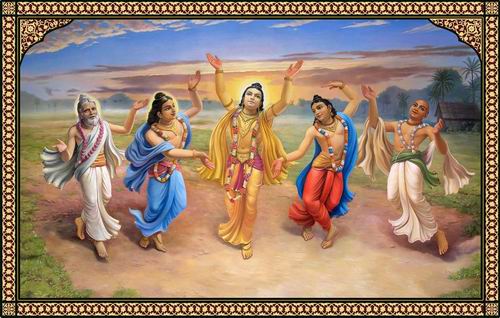
Whilst relaxing in a nearby park the other day I observed a heron bird motionlessly poised in the shallows of a lake. As he effortlessly balanced on one leg like a great yogi, he seemed completely absorbed in silent meditation, aloof to the passers by and pigeons battling for scraps of bread. Seeking to become disinterested with the temporary thrills of this world and instead focusing on deeper more substantial spiritual experiences are the goals of those sincerely practicing yoga. At first one may have been misled into believing the herons show of control and sensory withdrawl were signs of advancement or yogic powers, but studied a little closer he will understand the mind of the bird. Although appearing detached and indifferent to the world, the heron is actually deeply meditating on his next catch by which he will enjoy and satisfy his taste for fish.
Unfortunately today we find many herod-like personalities dressed as yogis, priests, monks and many more. Whilst poising as spiritual leaders, renunciants, meditators or gurus, certain people are to found who, within, are a very different person from what their masquerade hides. Once, while traveling by train, I sat across table from a female religious leader dressed in full attire. As the journey commenced she smiled at her friend and produced a bottle of French wine, Bordeaux of course. Upon opening and smelling the cork they agreed that it would be a delightful travel. I reflected on the teachings of Bhagavad Gita, proclaiming that a leader must lead by exemplary behavior (click). As a great person acts, common men will follow. Considering the problems with alcohol in society, I felt sorry for the lack of responsibility from such a "spiritual leader". Many claim to be self controlled, yet within they contemplate sexual affairs, or they proudly meditate for 30 minutes a day, but then perform all nonsense for the remainder. This is the heron syndrome (click). Of course not all are cheaters, but one should learn to recognize the characteristics of one who is truly pure in motive.
In a Sanskrit dictionary I looked up a word baka; a hypocrite , cheat , rogue , the crane/heron being regarded as a bird of great cunning and deceit.
In the great histories of ancient India there is an account of Krishna, the supreme personality of godhead, and how he deals which such cheaters. Krishna appears at certain intervals in order to bring relief to pure personalities dedicated to his loving service, as well as to remove any unwanted burden from society. As his pastimes progress he seemingly grows like an ordinary child yet never ages beyond a fresh youth of 16 year appearance. When Krishna spoke the powerful philosophy of Bhagavad Gita (click), he was 125 years old, yet was moving with the grace of a youth, without the aid of a cane of walking frame.
So, one morning as Krishna was playing in the forest with his friends and their calves, they approached the river Yamuna. There they came across a terrifying sight, a huge heron like bird pounding its way towards them. This was Bakasura, a powerful yogi friend of the tyrannical ruler Kamsa. Bakasura, who by his yogic power, had assumed the form of a gigantic heron, represents this cunning duplicity or hypocrisy. He came there with the intention to kill Krishna and all his friends, just as he had killed countless other innocent victims. He was so large that he appeared like a mountain and with his sharp beak he tried to pierce the butter soft body of Krishna. Within a flash he gobbled up Krishna and swallowed him whole, much to the despair of Krishna's friends. Yet, because Krishna is the source of all spiritual energy, he felt like a burning fire within the throat of the demoniac child killer. Both the sun and fire have potential to severely burn, and they are just reflections of the potency of Krishna. Immediately Bakasura coughed out beautiful Krishna, who took hold of his beak in both hands and effortlessly bifurcated the monster, killing him instantly. For Krishna, God, his killing is as good and beneficial as his saving someone, so Bakasura was released from his sinful reactions and liberated.
Looking inwards we may well find that we also possess some of this hypocritical tendency. How often do we perform our activities, our prayers, meditations and hope that someone is becoming impressed by our show? Purity entails giving up all selfish motivations and offering everything to Krishna, complete self-giving. We are so fortunate that we can relish such activities of Krishna so that all heron-like impurities will be purged from our hearts and pure spiritual existence will once again be our natural position.
These pastimes and many more can be downloaded here, this pastime is within Krsna book.
















